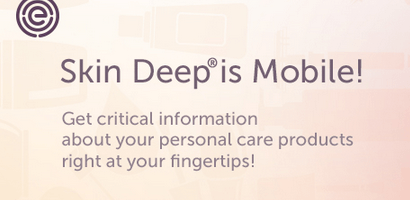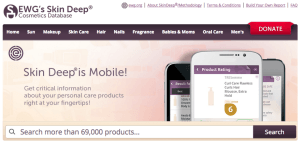Skin Deep Database: The Only Truth Behind Product Safety?

The @US_FDA does not regulate the ingredients in our #beauty products, so the @EWG #skindeep #database protects us. #digitalhealthrevolution
Did you know that the ingredients in your toothpaste, deodorant and lip gloss are not tested for safety? Most consumers do not realize that unlike food and drugs, the FDA does not regulate the multi-billion-dollar beauty industry. Companies are not even required to test their products for safety before they hit store shelves. According to the FDA website, “Under U.S. law, FDA does not have the authority to require cosmetic manufacturers to submit their safety data to the FDA.” While the European Union has banned 1,373 ingredients to date, the FDA has banned 8 and restricted 3. So if the FDA is not protecting our health from the potentially toxic ingredients in the products we rub on our skin every single day, who is actually protecting us?
The Environmental Working Group is a non-profit organization on a mission “to empower people to live healthier lives in a healthier environment.” They use the power of information to “drive consumer choice and civic action.” The EWG’s Skin Deep Database was launched in 2004 as an online product and ingredient database that contains information about the ingredients in over 69,000 products. Every product that is added to Skin Deep from companies and consumers is carefully reviewed by the organization to identify product type, product use and composition, target demographic, and special product claims. Each ingredient name is given a unique identification number in the database and is then sorted by safety status. By pooling scientific studies and regulatory statuses from 60 sources, including government agencies, industry panels, academic institutions and other credible bodies, the EWG is able to assess the potential health effects and data gaps for the majority of cosmetic ingredients on the market today. Each product is rated on a scale from 0 (very safe) to 10 (potentially toxic,) and consumers are able to type in any product name and learn the truth about the ingredients.
The Skin Deep Database is #winning because it is the only digital platform providing accurate, accessible information about the ingredients in our cosmetics and skincare products. The EWG has created an effective, user-friendly platform that enables consumers to take a less passive role in product safety and become proactive about their lifestyle choices. While potential competition is emerging from apps like ThinkDirty, the EWG is constantly strengthening their database by pursuing groundbreaking research and developments in health and wellness. They were the first organization to “map the pollution in people” through their Human Toxome Project, which tests human blood for levels of chemical compounds found in consumer products and open-sources the results. This study not only proved that the ingredients in our everyday products are absorbed into the bloodstream and actually accumulate in our bodies, but it also transformed our conception of personal safety and corporate transparency. My own blood was tested in the Teen Body Burden Study, and when I learned that I had above-average levels of parabens compared to the other teenagers tested, I radically changed my lifestyle and took precautionary measures to avoid harmful chemical exposures. I am proud to share this intimate information with the world, as I believe it will inspire others to take action.
There are inherent flaws to Skin Deep, like the overall lack of data that creates a degree of uncertainty in the system, but this challenge is representative of the beauty industry in total. How can we prove that a chemical is or is not safe when there have not been any comprehensive studies that demonstrate long-term impact? How can we ensure our products are safe when companies are not even required to report their ingredients to any entity? At this time, Skin Deep remains the most customer-centric resource for instant, personalized product safety information, representing a universal shift towards digital health and wellness platforms. The FDA does not regulate the ingredients in our beauty products, but the EWG is doing its best to protect us.




I’m not sure about this database. I’m admittedly skeptical of the whole chemi-phobia thing, but this database is sketchy.
Like this product, rated a seemingly dangerous ‘9’. http://www.ewg.org/skindeep/product/157802/Aquolina_Pink_Sugar_Deo_Natural_No_Gas/
So, avoid at all costs–except I can click the picture and get a referral-link to buy it on Amazon? Plus, one of the most ‘dangerous’ ingredients, fragrance (?), is rated an 8–just 1 below actual mercury, which is a 9. Being informed is one thing, but this just feels like fear-mongering for referral-$.
@Brandon, a few responses to your points:
The reason why that product is rated a 9 is because it contains synthetic “fragrance,” which is a proprietary blend of up to hundreds of compounds that are typically phthalates– hormone disruptors that have been linked to the feminization of baby boys:
http://www.nytimes.com/2009/07/16/opinion/16kristof.html
http://www.ncbi.nlm.nih.gov/pmc/articles/PMC2874619/
The EWG links to Amazon so consumers can see the actual ingredient deck and product photos. They absolutely do not get affiliate sales from Amazon. Their mission is to convince companies like Aquolina to reformulate. And you can see from the page that the “data is limited,” which I highlighted as an overall industry issue, as companies are not required to disclose their full ingredient list, especially if they use “fragrance,” which is a “trade secret.” This is a major public health threat because if a consumer gets an allergic reaction to a product like this, the “fragrance” does not provide any insight to what caused the reaction.
Also, this product is an antiperspirant, which contains heavy metals and other harsh ingredients to stop us from sweating. We should be scared of some of these ingredients, because they are not regulated or tested for safety. So “chemi-phobia” is valid in this case!
That’s a good point – i wasn’t being fair with respect to limited data.
but just to clarify, the Amazon link is a referral – not on that product, but here’s the link for Aveeno Active Naturals Positively Radiant Tinted Moisturizer, a “10” on the danger-o-meter.
http://www.amazon.com/dp/B00BM3IZIS?tag=ewgcosmeticsdatabase-20
The last part is a referral ID. I don’t think that means they’re necessarily biased, just that there’s potential they’re not totally financially disinterested
While I love the idea behind this site, I wonder whether it is a winner as I think it leaves a lot of value on the table. I am an avid beauty products purchaser, both in store and online, yet I have never heard of this site. I am surprised that given my shopping habits, along with my social media engagement across Facebook, Instagram, etc. that the name of this site has not surfaced. In order to win digitally, perhaps Skin Deep needs a better strategy to build its brand via social media. I imagine they could leverage network effects if they can get enough scale – perhaps partnering with health-conscious celebrities or finding a pioneering brand that has changed its ways would be a big step in the right direction. This would also help resolve some of the credibility issues Skin Deep faces. These issues are crucial to tackle because credibility is of the utmost importance for a health-related business.
Jess – This is a very interesting topic! On the topic of The Skin Deep Database winning, I am curious to know how successful it has been in terms of its real impact in empowering X people to make Y more informed decisions, or choices that are better for them. I haven’t heard of the initiative previously, but would be interested to know by what metric it has manifested success.
Subsequently, by this metric or others, it would be great to know what you think The Skin Deep Database needs to do to achieve greater success and/or get to the next level.